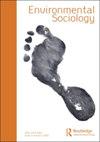美国州级碳排放量与平均工作时间之间的关系:一项复制研究
IF 2.8
Q3 ENVIRONMENTAL STUDIES
引用次数: 5
摘要
摘要气候变化可能是人类在下个世纪面临的最紧迫的问题。气候变化的一个拟议解决方案是减少员工工作时间,这可能会在不大幅增加失业率的情况下实现经济衰退或彻底重组。Fitzgerald、Schor和Jorgenson的研究利用美国2007-2013年的数据,通过发现平均工作时间与州级二氧化碳排放量之间存在积极且具有统计学意义的关系,为这一政策选择提供了支持。我们通过纳入更新的数据来复制他们的分析,并证实了一个州的平均工作时间与年度总二氧化碳排放量之间的联系。此外,我们发现,在最近添加的数据(2014年至2017年)中,这种直接关系更强。最后,我们提出了更多的政策建议,以此作为复制工作的总结。本文章由计算机程序翻译,如有差异,请以英文原文为准。
The relationship between state-level carbon emissions and average working hours in the United States: a replication study
ABSTRACT Climate change is perhaps the most pressing problem facing humanity over the coming century. One proposed solution to climate change is reducing employee work hours which potentially allows for degrowth or the radical restructuring of the economy without greatly increasing unemployment. Using 2007–2013 data from the United States, research by Fitzgerald, Schor, and Jorgenson lent support to this policy option by finding a positive and statistically significant relationship between average work hours and state-level CO2 emissions. We replicated their analyses by including more recent data and confirmed the linkage between the average hours worked in a state and annual overall CO2 emissions. Moreover, we found that this direct relationship is stronger in the most recently added data (2014 to 2017). We conclude this replication exercise by providing additional policy suggestions.
求助全文
通过发布文献求助,成功后即可免费获取论文全文。
去求助
来源期刊

Environmental Sociology
ENVIRONMENTAL STUDIES-
CiteScore
4.60
自引率
12.00%
发文量
34
期刊介绍:
Environmental Sociology is dedicated to applying and advancing the sociological imagination in relation to a wide variety of environmental challenges, controversies and issues, at every level from the global to local, from ‘world culture’ to diverse local perspectives. As an international, peer-reviewed scholarly journal, Environmental Sociology aims to stretch the conceptual and theoretical boundaries of both environmental and mainstream sociology, to highlight the relevance of sociological research for environmental policy and management, to disseminate the results of sociological research, and to engage in productive dialogue and debate with other disciplines in the social, natural and ecological sciences. Contributions may utilize a variety of theoretical orientations including, but not restricted to: critical theory, cultural sociology, ecofeminism, ecological modernization, environmental justice, organizational sociology, political ecology, political economy, post-colonial studies, risk theory, social psychology, science and technology studies, globalization, world-systems analysis, and so on. Cross- and transdisciplinary contributions are welcome where they demonstrate a novel attempt to understand social-ecological relationships in a manner that engages with the core concerns of sociology in social relationships, institutions, practices and processes. All methodological approaches in the environmental social sciences – qualitative, quantitative, integrative, spatial, policy analysis, etc. – are welcomed. Environmental Sociology welcomes high-quality submissions from scholars around the world.
 求助内容:
求助内容: 应助结果提醒方式:
应助结果提醒方式:


